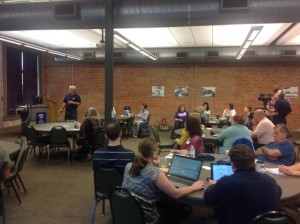Successful CETL Summer Institute gives faculty new insights on student engagment

Last week the The CETL, in partnership with AVID for Higher Education hosted the 2015 Summer Institute. The focus for this year’s event was enhancing student engagement.
AVID, which stands for "Advancement Via Individual Determination,"& is a non-profit organization offering strategies to assist campuses in improving college success. Speakers for the event were Billy Madigan and Kristi Gerdes, of AVID for Higher Education.
Sessions Devoted to Strategies
The first day’s sessions were led by Billy Madigan. His thought-provoking opening keynote, Culture, Connection and Embodied Cognition, was inspiring and insightful. Madigan encouraged faculty to reflect on the strategies they incorporate to build strong connections with students.
Empathic connections, taking the time to really get to know students and adjusting approaches accordingly are examples of how teachers can create an environment for deep learning. This presentation resonated with me given our campus culture and emphasis on student-centered teaching.
Madigan presented sessions in the afternoon on metacognition and building deep structures to guide learning and instruction. Connections, community building, self-direction and self-monitoring are just a few of the concepts that were shared. We worked in groups and learned several classroom strategies such as Reciprocal Teaching, Focused Note-Taking and 10-2-2 Lecture.
The sessions for day two were led by Kristi Gerdes. Gerdes presented several strategies aimed at developing students’ critical reading and writing skills. Gerdes presented academic reading as a series of steps consisting of:
- Establishing a purpose for reading
- Understanding Academic Vocabulary
- Pre-Reading
- Interacting with the Text
- Extending beyond the Text
Faculty and Staff Contributions
Tuesday during lunch, Christopher Ohan, Ph.D., professor of history, shared an example of a high-engagement strategy he uses to enhance and extend course discussions. Having incorporated the use of VoiceThread, an online communication tool in his Modern American History course, Dr. Ohan has successfully extended course discussions outside of the class as well as experienced increased student participation in the discussions.
On Wednesday, Michael Anne Greer and Kelly Anderson from the Academic Success Center shared how they incorporate AVID principles in tutoring and other student services.
Reflections from the CETL Director
In reflecting on the Summer Institute, I was inspired by the amount of idea sharing amongst faculty. Both days, faculty were engaged in deep discussion on the ideas and activities presented.
With the focus on continued development of strategies to enhance student achievement, my hope is that faculty will continue sharing ideas with each other. I would also encourage faculty to consider specific means for the integration of these and other new strategies into their classroom.
From Billy sharing the importance of connecting with students to Kristi sharing instructional strategies for academic reading and writing, I am inspired to challenge my teaching and commit to incorporating one or two of the strategies in my own practice. Recognizing the implementation as a process rather than an event (one-time) will drive my efforts for sustainability.
Last but certainly not least, the sessions for the institute were recorded. The CETL piloted the use of Mediasite technology, a university solution for video capture, video streaming, publishing and video management.
All the Best,
Lisa Hammonds







